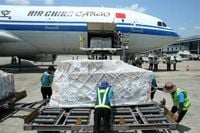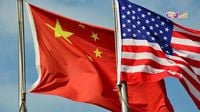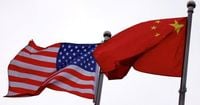In a significant escalation of trade tensions, China has urged South Korean companies to halt exports of products containing rare earth elements to U.S. defense contractors. This directive, reported by the Korea Economic Daily, is part of China’s broader strategy in response to ongoing trade disputes with the United States, which began with tariffs imposed during President Donald Trump’s administration.
China's rare earths are essential in the production of various critical technologies, including defense systems, electronics, and renewable energy technologies. The country is a dominant player in this market, producing approximately 95% of the world’s rare earth magnets, which are vital components in electric vehicles (EVs), smartphones, wind turbines, and military hardware such as missiles and drones.
The recent restrictions on rare earth exports are viewed as a strategic maneuver by China to assert control over these crucial materials. By limiting exports, China is exerting additional pressure on U.S. and South Korean companies that heavily rely on rare earth minerals for manufacturing key components like power transformers, displays, and batteries.
Letters from China’s Ministry of Commerce have put South Korean companies on notice, warning them of potential sanctions if they continue to supply rare earth products to U.S. defense firms. This warning has raised alarms among South Korean manufacturers, particularly in the electronics and automotive sectors, who may face severely restricted export routes. South Korea is a key player in the global supply of advanced technologies, and the implications of these restrictions could be profound.
In light of these developments, many South Korean businesses are urgently reassessing their dependence on Chinese rare earths and are actively seeking alternative sources for these vital materials. However, given China's significant control over the market, finding substitute suppliers in the short term is unlikely to be straightforward.
This situation underscores the strategic importance of rare earths in the ongoing trade war between the U.S. and China. Rare earths are not merely commodities; they have become geopolitical assets in this economic rivalry. With the tariffs from the Trump era still in effect, China’s export restrictions serve as a clear signal that it is willing to leverage its dominance in the rare earth market as a bargaining chip in the trade dispute.
U.S. defense and technology firms, which rely heavily on rare earths, are now scrambling to find alternative suppliers. However, they face significant challenges due to China's near-total dominance in this sector. Experts warn that the tightening of China’s rare earth export controls could disrupt global supply chains across various industries, from defense to clean energy. Countries and companies that have long relied on Chinese exports may now encounter higher prices and limited availability of these essential materials.
Moreover, disruptions in the supply of rare earth materials could hinder the adoption of clean energy technologies. With the global push toward renewable energy and electric vehicles, rare earths like neodymium and praseodymium are critical for manufacturing powerful magnets used in EV motors. Any interruption in the supply chain could slow down progress in these sectors.
As the U.S. and China continue to clash over tariffs and trade imbalances, rare earths have emerged as a significant battleground in their economic rivalry. The ongoing tension between these two superpowers holds far-reaching consequences not only for the defense and high-tech sectors but also for global efforts to combat climate change through the development of green technologies.
With China tightening its grip on rare earth exports, countries like the U.S. and South Korea are likely to expedite their efforts to develop domestic sources of these critical materials. However, given the scale of China’s dominance, establishing alternative supply chains that can match China’s output will require substantial time and investment.
In addition to these trade tensions, China has expanded its export controls on rare earth minerals and magnets, further intensifying its trade retaliation against the United States. These new restrictions affect seven rare earth elements and signal a broader strategy by China to control access to these materials.
In response to the recent developments, South Korea's industry ministry is currently investigating the situation and has stated that it is checking with the Chinese government and South Korean companies to confirm the reports of the new export restrictions. The ministry emphasized that it has not yet confirmed whether South Korean companies have received official letters from the Chinese government regarding the sanctions.
In early April, South Korea reported that it had more than six months of stockpiles of some of the seven rare earths restricted by China, including dysprosium, which is used in special magnets found in clean energy applications like electric vehicles and wind turbines. Senior South Korean government officials are scheduled to meet with their U.S. counterparts in Washington to discuss tariffs and the implications of the new restrictions.
As the situation unfolds, the global market watches closely. The ramifications of these trade tensions extend beyond immediate economic impacts, potentially reshaping international alliances and supply chains in the years to come. With both nations at a critical juncture, the future of rare earth exports and their role in global technology and defense industries remains uncertain.



